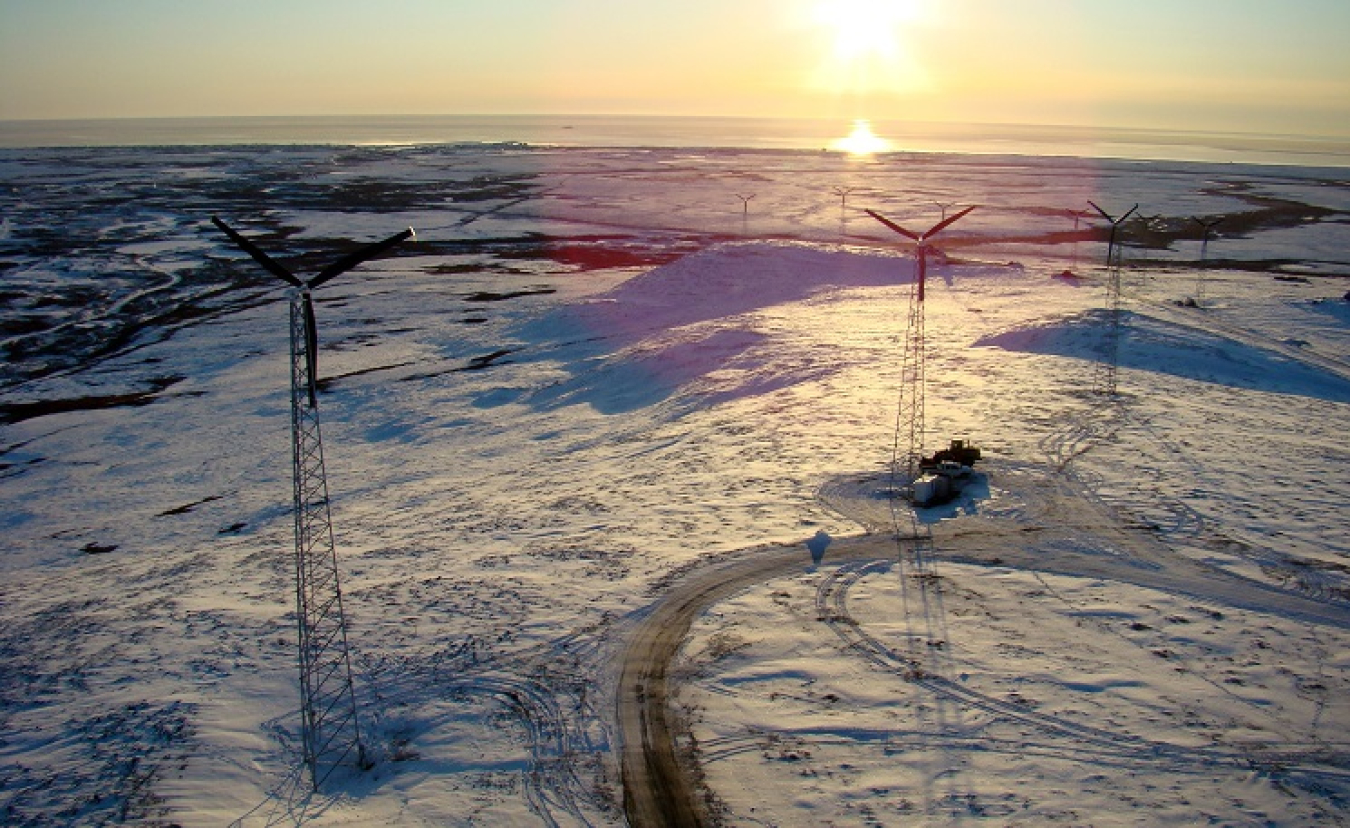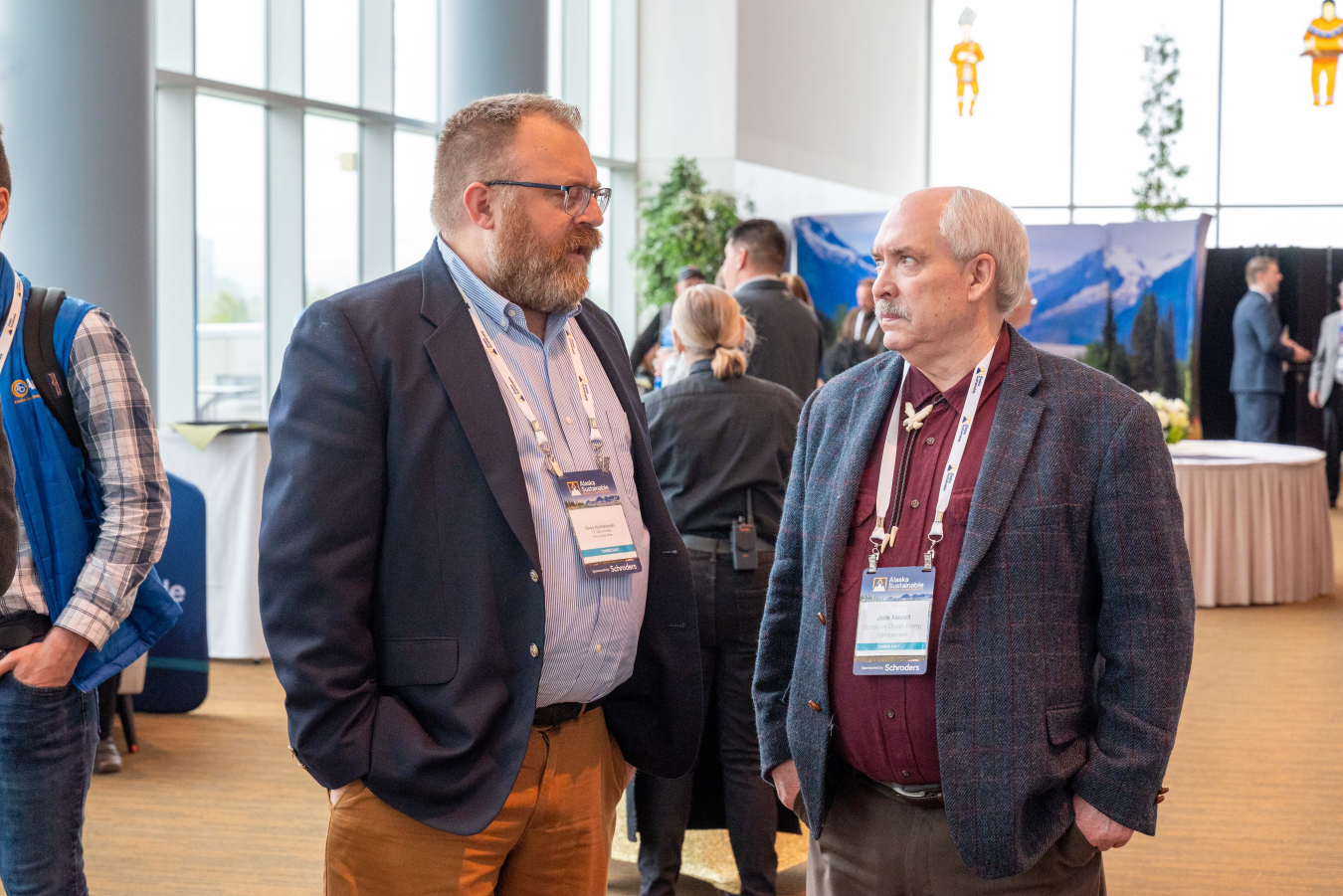DOE hosted a Community- and Facility-Scale Renewable Energy Project Development and Finance workshop in Nome, Alaska, Aug. 21-22.
Office of Indian Energy Policy and Programs
September 22, 2014
A 900-kW Native-owned wind farm generates 10% of Nome's electricity, reducing dependence on diesel fuel. Photo from Bering Straits Native Corp., NREL 16298
Based on strong interest and several requests from tribal entities across the Bering Straits region, the U.S. Department of Energy (DOE) Office of Indian Energy and the Tribal Energy Program hosted a Community- and Facility-Scale Renewable Energy Project Development and Finance workshop in Nome, Alaska, Aug. 21-22. This was the second regional workshop DOE conducted this year in Alaska, and the first time newly developed Alaska-specific renewable energy educational curriculum was presented.
The remoteness of the region, the lack of infrastructure, the harsh environment, and the increasingly dramatic impacts of climate change all have profound effects on energy needs, costs, and accessibility throughout rural Alaska. As a result, energy is one of the most pressing challenges that rural Alaskans face, as reported by local radio station KNOM, which broadcast a news story about the workshop on Aug. 28.
Designed to help elected tribal leaders, executives, and staff members better understand the process for and potential pitfalls of developing community- and facility-scale renewable energy projects, the workshop walked participants through a five-step project development process tailored specifically to tribal communities. For participants, who represented six Native villages and several other tribal entities in western Alaska, this was a highly interactive, hands-on experience geared toward addressing the realities they face on the ground.
As they worked through the exercises, participants began to see how community strategic energy planning and the development of a renewable energy project might advance their communities’ energy visions and goals. Through case studies presented at the workshop, they also had the opportunity to learn from the experience of other communities that have undertaken renewable energy development projects.
At the end of the two days, the participants I spoke to had a clearer picture of the energy landscape, development process, and lessons learned. More importantly, they walked away from the training with a higher level of understanding that will afford them greater confidence when discussing renewable energy project development possibilities with developers and financing options with potential investors. Many shared their interest in expanding their partnership with DOE and intend to seek follow-on support through DOE technical assistance, funding, and other related future opportunities.
In rural Alaska, energy is just one of a host of challenges Native villages face. Yet, these energy challenges also present opportunities in the 12 Alaska regions. Native villages have very small populations, but they have an abundance of natural resources, including renewable energy resources like wind, solar, and biomass. Energy projects produce jobs, spur economic development, and ideally reduce the total amount of personal income spent to keep the lights on and a home warm. As communities embrace more renewable technologies and drive down the cost to produce energy, these challenges fade and set the foundation for stronger, more vibrant energy-secure communities in the future.
Although I am a Headquarters DOE Program Manager for the DOE Office of Indian Energy, my role is to promote Alaska Native energy cost reduction, economic development, and increased self-determination for all Tribes. I have the privilege of being based in Anchorage, and over the next year, I will be leading an expansion of our program initiatives in Alaska. By maximizing the government-to-government relationship all federally recognized Tribes have with the federal government and by leading coordinated, interagency support for tribal energy needs and projects, I am confident that we can build on the successes already achieved over the past two years through programs like START Alaska.
Over the course of my federal military and civil service career, I have spent significant time learning about and overcoming the challenges of climate, distance, energy, and logistics. One thing that experience has revealed is that the state’s challenges are rivaled only by the resilience and resourcefulness of its people. Alaska’s indigenous populations have a strong connection to the land and a deep understanding of both the privilege and responsibility that come with the stewardship of those lands. They have lived here for thousands of years. Blending this lineage of local knowledge with the best of current tools, information, and technology, the Alaska Native villages’ capacity to harness their latent potential for renewable energy and energy efficiency development can grow tremendously. I look forward to the opportunity to facilitate that growth.
Please feel free to call or email me anytime to discuss how DOE may be able to assist Alska Native villages with building a stronger, more sustainable future.
Givey Kochanowski
Alaska Program Manager
510 L Street, Suite 420
Anchorage, AK 99501
907-271-1423
Givey Kochanowski

Givey Kochanowski was a senior advisor on Alaska for the Arctic Energy Office, as a detailee from DOE’s Office of Indian Energy Policy and Programs until October 2023.
Before joining the Arctic Energy Office, Givey served eight years in DOE’s Office of Indian Energy Policy and Programs as both the Alaska Program Manager and Senior Advisor. He re-established DOE’s physical presence in Alaska and was the first career employee hired in that office. He delivered technical assistance, capacity building, energy education, and outreach to Alaskan tribal entities to reduce energy costs and improve economic development.
He has an extensive military and international affairs background from his tenure as a Customer Service Director at the U.S. General Services Administration in Alaska and overseas. He also brings Alaskan logistics expertise from his position as the U.S. Forest Service’s Alaska Regional Fleet Manager and as an active duty Air Force commissioned officer.
He is a 2001 U.S. Air Force Academy graduate with assignments at Eglin AFB in Florida, Kunsan Air Base in the Republic of Korea, and Elmendorf AFB in Alaska. He earned his Master of Arts in International Relations from the University of Oklahoma.
Keep In Touch
Drop us a note any time at [email protected] and keep in touch with our work through our social media channels (Facebook, LinkedIn, and Twitter) or our newsletter.


